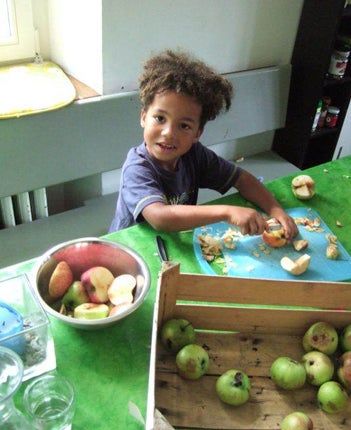Who's your Dada? Art project seeks couple for name game

A Swiss artistic duo is seeking a Russian couple expecting a baby this autumn to offer an unusual proposition: call your baby "Dada" and we'll give you $10,000 (£6,000).
The bizarre deal is part of a long-term project in the run-up to the centenary of the Dada artistic movement in 2016.
The Russian child will be the second Dada in a "global network of children called Dada", says Johannes Hedinger, one half of the Com&Com duo behind the project, which has been labelled Gugusdada.
Already, there is Dada Kim Osarimen Izvebige, born in Switzerland in 2004 and named Dada to celebrate the reopening of Cabaret Voltaire, the Zurich venue that is seen as the birthplace of the Dada movement. It had been closed for 60 years and the first Dada child project was partly aimed at garnering publicity for it reopening.
Now the plan is to take Dada babies global. "We want to have at least four or five more Dadas by 2016," Mr Hedinger says.
"We'd like to have them from Africa and Asia as well."
In the centenary year, the artists hope to gather all the children in Zurich, where the cultural movement had its origins. But it spread to many countries beginning at the height of the First World War in 1916. It used abstract art and often childish language to ridicule the absurdity of the modern world.
The first Dada performances were put on by a group of avant-garde poets, writers and performances artists at Cabaret Voltaire. The movement was anti-war and anarchist in nature, inspiring many later artistic and intellectual movements.
Among the questions in the FAQ section on Gugusdada's website are: "Is it legal?" and "Is it art?" Unsurprisingly, the artists claim that the answer to both questions is "Yes", and Mr Hedinger insists that the project is more than just a publicity stunt. He says that the Gugusdada concept is an example of "ready-made" art – the idea that something which exists already in another context can be rebranded as art, in this case, a human being. It draws on earlier examples such as that of Marcel Duchamp, one of Dada's best-known luminaries, who produced an artwork named Fountain that was simply a urinal. In 2004, a group of 500 artists and curators named Fountain the most influential artwork of the 20th century.
The Moscow project is part of the city's Art Biennale, which will take place in September and October. The artists are seeking a couple who have a baby due exactly during the period of the festival. An added peculiarity of the Moscow Dada baby is that Dada in Russian means "Yes, Yes", a potential embarrassment for any child.
Nevertheless, the duo expect to receive plenty of applications when the project is properly launched in the coming weeks and word gets around. The artists say that they will shortlist about 10 couples and interview them in Moscow, along with their Russian gallery partners and medical experts. The final decision will be based on a number of criteria, including the parents' attitude to the project and the concept of Dadaism.
"We understand that people may well want or need the money, but we don't just want to give this to people who are going to use the money to buy a new car," Mr Hedinger says.
"We hope that the money will be used for the child's education; we want to choose people who understand what this is about. In many ways this is a project for life; we are building a new network for these children."
Join our commenting forum
Join thought-provoking conversations, follow other Independent readers and see their replies
Comments
Bookmark popover
Removed from bookmarks